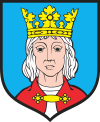Königsberg (Neumark)
| Chojna | ||
|---|---|---|

Panorama of the town
|
||
|
||
| Coordinates: 52°58′N 14°25′E / 52.967°N 14.417°E | ||
| Country |
|
|
| Voivodeship | West Pomeranian | |
| County | Gryfino | |
| Gmina | Chojna | |
| Town rights | 1255 | |
| Government | ||
| • Mayor | Adam Fedorowicz | |
| Area | ||
| • Total | 12.12 km2 (4.68 sq mi) | |
| Population (2006) | ||
| • Total | 7,187 | |
| • Density | 590/km2 (1,500/sq mi) | |
| Time zone | CET (UTC+1) | |
| • Summer (DST) | CEST (UTC+2) | |
| Postal code | 74-500 | |
| Area code(s) | +48 91 | |
| Car plates | ZGR | |
| Website | http://www.chojna.pl | |
Chojna pronounced [ˈxɔi̯na] (German: Königsberg in der Neumark; Kashubian: Czińsbarg; Latin: Regiomontanus Neomarchicus "King's Mountain in (the) New March") is a small town in western Poland in the West Pomeranian Voivodeship. It lies approximately 60 kilometres (37 miles) south of Szczecin.
Chojna is located near two border crossings (Hohenwutzen and Schwedt) on the Oder River with Germany. It participates in the EU Douzelage town twinning initiative.
From the 10th-12th centuries an early Pomeranian fortification, probably with a market, developed at the location of present-day Chojna. Because of its favorable location on trading routes leading to the principalities of Greater Poland and the duchies of Pomerania, the settlement developed quickly. Duke Boguslaw I of Pomerania was entombed in the settlement's church after his death in 1187. After 1200 the settlement received Magdeburg rights from Duke Barnim I the Good. It was referred to as "Konigesberge" for the first time in 1244 and passed to the Bishopric of Brandenburg after Bishop Otto of Brandenburg had acquired part of the New March in 1252. Populated with German knights and colonists, the town's name "Konigesberge" evolved into the German name "Königsberg" ("King's Mountain"), with the epithet in der Neumark (i.e. in the New March) added to distinguish it from namesakes in East Prussia and Bavaria. After in 1267 Bishop Henry I of Brandenburg had ceded the "terra Konigesberge" to the Ascanian Margraves of Brandenburg, the town was granted the right to hold a market as well as regional legal jurisdiction, causing it to become the main town of the New March at that time.
...
Wikipedia


